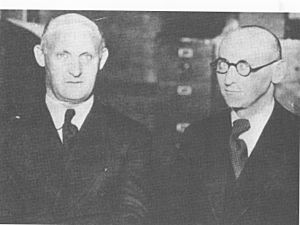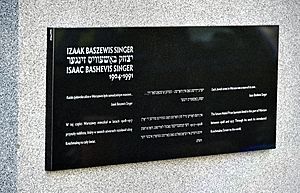Isaac Bashevis Singer facts for kids
Quick facts for kids
Isaac Bashevis Singer
|
|
|---|---|
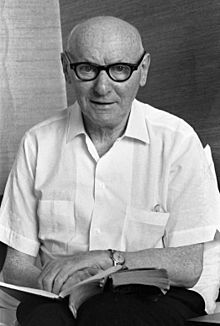
Isaac Bashevis Singer in 1969
|
|
| Born | Izaak Zynger November 11, 1903 Leoncin, Congress Poland, Russian Empire |
| Died | July 24, 1991 (aged 87) Surfside, Florida, United States |
| Pen name | Bashevis, Warszawski (pron. Varshavsky), D. Segal |
| Occupation | Novelist, short story writer |
| Language | Yiddish |
| Citizenship | Poland, United States |
| Genre | Fictional prose |
| Notable works | The Magician of Lublin A Day of Pleasure |
| Notable awards | Nobel Prize in Literature 1978 |
| Signature | |
 |
|
Isaac Bashevis Singer (Yiddish: יצחק באַשעװיס זינגער; November 11, 1903 – July 24, 1991) was a famous writer. He was born in Poland and later became an American Jewish author. He wrote many novels, plays, and short stories.
Singer wrote mostly in Yiddish, a language spoken by many Jewish people in Eastern Europe. He later helped translate his own books into English. In 1978, he won the amazing Nobel Prize for Literature. He also won two U.S. National Book Awards. One was for his children's memoir, A Day of Pleasure: Stories of a Boy Growing Up in Warsaw (1970). The other was for his collection of stories, A Crown of Feathers and Other Stories (1974).
Contents
About Isaac Bashevis Singer's Life
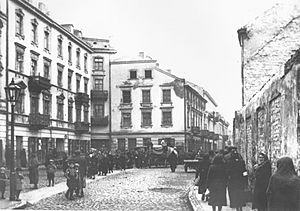
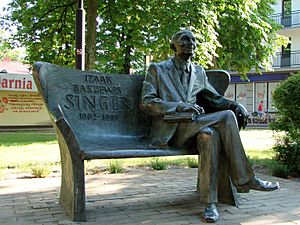
Isaac Bashevis Singer was born in 1903 in a small village called Leoncin near Warsaw, Poland. His family was Jewish. The exact date of his birth is not fully known, but November 11, 1903, is the most likely date.
His father was a Hasidic rabbi, a Jewish religious leader. His mother, Bathsheba, was also the daughter of a rabbi. Singer later used his mother's first name, Bashevis, as part of his writing name. Both of his older siblings, sister Esther Kreitman and brother Israel Joshua Singer, also became writers. Esther was actually the first in the family to write stories!
In 1908, his family moved to Warsaw. They lived on Krochmalna Street. This street was in a poor, Yiddish-speaking Jewish part of the city. His father worked as a rabbi there, helping the Jewish community with religious matters and advice. The special feeling of this street before World War II can be found in many of Singer's stories.
World War I and Early Career
During World War I, in 1917, life became very hard. Singer's family had to split up. He moved with his mother and younger brother to his mother's hometown of Biłgoraj. This was a traditional Jewish village called a shtetl.
In 1921, Singer returned to Warsaw. He tried studying at a rabbinical school but soon realized it wasn't for him. He went back to Biłgoraj and tried teaching Hebrew, but he didn't succeed. In 1923, his older brother Israel Joshua helped him get a job in Warsaw. He became a proofreader for a Jewish magazine called Literarishe Bleter.
Moving to the United States
In 1935, Singer moved from Poland to the United States. He was worried about the growing danger from Nazi Germany. This move meant he was separated from his first wife and son, who went to Palestine. He finally met them again in 1955.
Singer settled in New York City. He started working as a journalist and writer for The Jewish Daily Forward. This was a Yiddish-language newspaper. At first, he felt a bit lost in America.
In 1938, he met Alma Wassermann, a Jewish refugee from Germany. They got married in 1940. After marrying Alma, Singer felt a burst of energy and started writing a lot again. He used different pen names, including "Bashevis" and "Warszawski."
Singer passed away on July 24, 1991, in Surfside, Florida. He was buried in New Jersey. Today, streets in Surfside, Florida, Lublin, Poland, and Tel-Aviv are named after him. There's even a scholarship at the University of Miami in his honor.
Isaac Bashevis Singer's Writing Career
Singer's first published story, "Oyf der elter" ("In Old Age"), won a writing contest in 1925. He published his first novel, Satan in Goray, in 1935. Later, in his book The Slave (1962), he told a love story between a Jewish man and a non-Jewish woman.
Language and Translations
Singer always wrote his original works in Yiddish. His novels were often first printed in parts in newspapers. He then worked to prepare his books and stories for English publication. He called his English versions his "second original" works. Some of his stories have not yet been translated from Yiddish.
Illustrators for His Books
Many talented artists illustrated Singer's books. These include Maurice Sendak, who is famous for children's books, and Irene Lieblich. Singer chose Irene Lieblich himself to illustrate two of his children's books. She was a survivor of The Holocaust and came from a town near where Singer grew up. Because their memories of Jewish village life were so similar, Singer felt her pictures were perfect for his stories. He said her art was "rooted in Jewish folklore."
Summary of His Works
Singer wrote at least 18 novels, 14 children's books, and many memoirs and essays. He is most famous for his short stories, which have been collected in over a dozen books. His first collection of short stories in English was Gimpel the Fool, published in 1957.
His stories and novels often showed the world of Jewish people in Eastern Europe, where he grew up. After living in America for many years, his stories also began to show the lives of immigrants and their search for the "American dream."
Before Singer won the Nobel Prize, many of his stories were published in popular magazines like Esquire. He often wrote about questions of right and wrong. Sometimes, his stories were controversial, meaning they caused debate.
He was awarded the Nobel Prize in 1978, which is one of the highest honors a writer can receive.
Film Adaptations of His Books
Several of Singer's books and stories have been made into movies:
- His novel Enemies, a Love Story became a film in 1989. It was very popular and brought new readers to his work.
- His story "Yentl, the Yeshiva Boy" was made into a play and then a movie called Yentl (1983). The famous singer and actress Barbra Streisand starred in and directed it.
- The Magician of Lublin (1979) was another film based on his work.
- A unique film called Mr. Singer's Nightmare and Mrs. Pupkos Beard (1974) was directed by Bruce Davidson. Singer himself wrote the script and acted in this film!
- The 2007 film Love Comes Lately was also based on several of Singer's stories.
Awards and Honors
Isaac Bashevis Singer received many important awards and honors:
- Jewish Book Council for The Slave, 1963
- Itzik Manger Prize, 1973
- National Book Award (United States), 1974
- Nobel Prize for Literature, 1978
Many places have been named in his honor:
- A street in Surfside, Florida
- A street in New York City (W. 86th St.)
- A street in Leoncin, Poland (ul. Isaaca Bashevisa Singera)
- A special plaque and a park square in Radzymin, Poland
- A city square in Lublin, Poland
- A street in Biłgoraj, Poland
He was also inducted into the Jewish-American Hall of Fame. Isaac Bashevis Singer is the only American Nobel Prize winner in Literature who did not also receive a Pulitzer Prize.
Published Works
Note: The dates below are for when the English versions of his books were published. The original Yiddish versions were often published 10 to 20 years earlier.
Novels
- Satan in Goray (1935)
- The Family Moskat (1950)
- The Magician of Lublin (1960)
- The Slave (1962)
- The Manor (1967)
- The Estate (1969)
- Enemies, a Love Story (1972)
- Shosha (1978)
- Old Love (1979)
- The Penitent (1983)
- The King of the Fields (1988)
- Scum (1991)
- The Certificate (1992)
- Meshugah (1994)
- Shadows on the Hudson (1997)
Short Story Collections
- Gimpel the Fool and Other Stories (1957)
- The Spinoza of Market Street (1961)
- Short Friday and Other Stories (1963)
- A Friend of Kafka and Other Stories (1970)
- A Crown of Feathers and Other Stories (1974)
- The Collected Stories (1982)
Books for Young Readers
- Zlateh the Goat and Other Stories (1966) – This book was a runner-up for the Newbery Medal.
- Mazel and Shlimazel (1967)
- The Fearsome Inn (1967) – Also a Newbery Honor Book.
- When Shlemiel Went to Warsaw and Other Stories (1968) – Another Newbery Honor Book.
- The Golem (1969)
- Elijah the Slave: A Hebrew Legend Retold (1970)
- Alone in the Wild Forest (1971)
- The Wicked City (1972)
- The Fools of Chelm and Their History (1973)
- Why Noah Chose the Dove (1974)
- A Tale of Three Wishes (1975)
- Naftali the Storyteller and His Horse, Sus (1976)
- The Power of Light – Eight Stories for Hanukkah (1980)
- Yentl the Yeshiva Boy (1983)
- Stories for Children (1984) – A collection of his children's stories.
See also
 In Spanish: Isaac Bashevis Singer para niños
In Spanish: Isaac Bashevis Singer para niños
- Jewish vegetarianism
- List of Jewish Nobel laureates
- Famous Polish Writers
 | Delilah Pierce |
 | Gordon Parks |
 | Augusta Savage |
 | Charles Ethan Porter |


